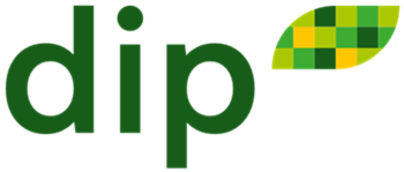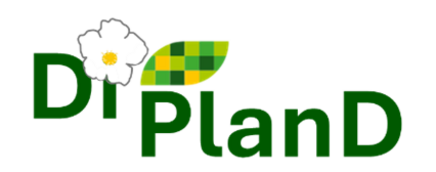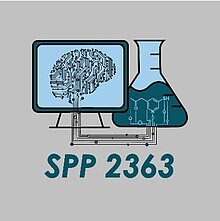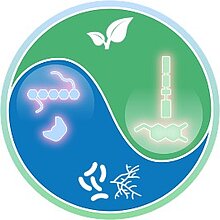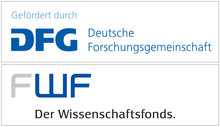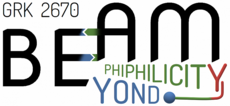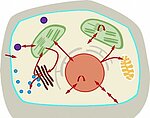Collaborative Projects as Partner
DIP – DiPlanD
Sustainably produced vegan vitamin D3 and cholesterol from Nierembergia repens
The growing demand for sustainably produced plant-based pharmaceuticals offers considerable innovation and market potentials. The aim of DiPlanD is to combine the regional expertise in the fields of plant breeding, biotechnology, digital systems for measurement and control, and analysis of active ingredients to establish Nierembergia (N.) repens as a new agricultural plant in the model region of Southern Saxony-Anhalt, in order to use it as a plant source of vitamin D3 and cholesterol for the pharmaceutical and cosmetic industry. The sterols from particularly promising N. repens accessions and cultivars will then be converted into biologically active vegan vitamin D3 and other potentially marketable sterol-based substances using biotechnology-based and digitally controlled technology. DiPlanD will create a new value-added chain from a plant species which is currently being used exclusively as an ornamental plant in the model region of Central Germany, and will create new jobs in the fields of crop production, machine harvesting, processing and production of pharmaceutical applications.
IPB's contribution to this project includes the cultivation of different accessions of the calcinogenic plant species N. repens under different climatic conditions. After harvesting at different age stages and separated by plant organs, an optimized extraction/isolation procedure for 7-dehydrocholesterol (and cholesterol) and other D-vitamers will be developed, which is also suitable for scale-up processes. For the reaction mixture of the UV-B-induced conversion of 7-dehydrocholesterol to vitamin D3, an isolation scheme is developed that separates vitamin D3 and the resulting minor components (e.g. lumichromes) and allows identity determination by spectroscopic methods.
Funding: BMBF
Part of the Research Association: DiP Sachsen-Anhalt Modellregion der Bioökonomie /Digitalisierung in pflanzlichen Wertschöpfungsketten (https://www.dip-sachsen-anhalt.de/ ) Funding periode IPB: 04/2024 – 08/2027
Coordination: Martin-Luther-University Halle-Wittenberg (Prof. Dr. Gabriele Stangl) Partners: Leibniz Institute of Plant Biochemistry, Dept. Bioorganic Chemistry; Martin-Luther-University Halle-Wittenberg, Institute of Agricultural and Nutritional Sciences (Prof. Dr. Gabriele Stangl); Julius Kühn-Institute, Institute for Breeding Research on Horticultural Crops (Prof. Dr. Frank Marthe); Gesellschaft zur Förderung von Medizin, Bio- und Umwelttechnologie, Environmental Biotechnology (Dipl.-Ing. Matthias Leifheit); Center for Economics of Materials at Fraunhofer Center for International Management and Knowledge Economy (Dr. Daniela Pufky-Heinrich)
Contact at IPB: Dr. Norbert Arnold
DFG Collaborative Research Center 1664
Plant Proteoform Diversity
Parallel sequencing of natural accessions in plant populations discovered a wealth of DNA sequence variation, which mainly include a particularly prominent type of sequence variant, known as single nucleotide polymorphism (SNP). Despite the extensive recognition of gene-trait relationships, our understanding of the effects of allelic variation on the function of a given specific proteoform, which is ultimately responsible for the translation of the genetic variation to the observed phenotypic variation, is still in its infancy. The major objective of SNP2Prot is to understand the translation of genome-encoded sequence variation to structural, mechanistic and functional proteoform diversity. In this CRC initiative, the close interdisciplinary collaboration between (molecular) plant research and protein research is prerequisite to elucidate and ultimately predict how a substantial part of naturally occurring genetic variation mechanistically translates into the manifestation of phenotypic traits. The IPB participates with seven projects in this CRC.
Funding: German Research Foundation (DFG)
Funding Period: since 2024
Coordinator: Martin-Luther University Halle-Wittenberg, Spokesperson: Prof. Marcel Quint
Partner: Leibniz Institute of Plant Biochemistry (IPB), Leibniz Institute of Plant Genetics and Crop Plant Research (IPK), Leipzig University
Contact at IPB: Prof. Tina Romeis
Website: https://snp2prot.uni-halle.de/
GreenProtect
A Sustainable Release System to Produce More Healthy Food with Less Pesticide
In the Leibniz transfer project Green-Protect, expertise from materials science, chemistry and biotechnology is being brought together to find new solutions for reducing the use of fungicides and herbicides in agriculture. To achieve this, biodegradable active ingredient containers, known as microgels, will be developed that can be loaded with fertilizers or pesticides and allow targeted release of these compounds to the desired plant organs. In this way, the amount of active substances and the required application cycles can be significantly reduced. Once the scientific concepts have been secured, technology transfer through to commercial implementation is planned.
Funding: Leibniz Competition
Funding Period: since 2023
Coordinator: Leibniz-Institut für Interaktive Materialien (DWI), RWTH Aachen University, Aachen
Partner: Leibniz-Institut für Pflanzenbiochemie (IPB)
Contact at IPB: Dr. Mehdi Davari, Prof. Ludger Wessjohann
Website: https://www.dwi.rwth-aachen.de/en/project/greenprotect
DFG Priority Programme SPP 2363
Utilization and Development of Machine Learning for Molecular Applications – Molecular Machine Learning
Artificial intelligence is indisputably among the fastest developing and most demanded topics of our time. Our goal is to develop and apply modern ML algorithms in their entire range to molecular problems. In the future, molecular machine learning should use generative models to suggest molecules with specific properties and activities, develop and optimize reactions independently, and evaluate and interpret analytical data within seconds. The applications developed should be converted in easy-to-use software suites and experimental scientists should be trained on them. Thus, this priority program will help to modernize an entire subject area. To achieve this, it is necessary to unite existing innovative efforts in the fields of biochemistry, chemistry, computer science, mathematics and pharmacy. This program will fulfill the AI strategy of the federal government and can establish Germany internationally as a leading location for molecular machine learning.
Subproject at IPB:
Machine learning approaches for faster discovery and adaptation of enzymes for difficult chemical reactions (MacBioSyn). Part I: providing solutions for regioselective oxygenations by 2OGD oxidases
Biocatalytic synthesis of chemicals is considered a keystone for future green and sustainable chemistry. However, its power is far from being realized today in industry, mainly because of the limited activity or diversity of accessible enzymes. 2-oxoglutarate-dependent (2OGD) proteins are an under-researched family of enzymes which catalyze “tricky” oxidative reactions (e.g., oxyfunctionalization of non-activated carbons, demethylations), which are challenging or cannot be performed using traditional chemosynthesis. Thus, 2OGD proteins have the high potential to revolutionize the industry as a regio- and product-specific “alternative to chemistry”. Identifying new representatives of this large family having, e.g., increased substrate scope can offer a new range of biocatalytic routes to, e.g., natural products. In the MacBioSyn project, we aim to develop (a general, high-throughput (HT)) ML-based framework (deep learning, active learning, reinforcement learning) that predicts the activity of enzymes and their substrate / reaction scope. We will implement a new in silico framework for the analysis of enzyme sequences/substrates pairs based on ML models trained on screening results by a synergistic approach, combining the interdisciplinary expertise of computational design / modeling (Davari) with HT enzyme characterization (Dippe/Wessjohann). To establish this platform, we will focus on 2OGD enzymes as proof-of-concept biocatalysts.
Funding: DFG
Funding Period: since 2022
DFG Project No.: 460865652, 497207454
Partner: Prof. Jean Loup Faulon, Micalis Institute FR
Contact at IPB: Dr. Mehdi Davari, Dr. Martin Dippe, Prof. Ludger Wessjohann
Project website: https://www.uni-muenster.de/SPP2363/
SFB Transregio TRR356
Genetic diversity shaping biotic interactions of plants (PlantMicrobe)
The interaction of plants with microorganisms can be beneficial or devastating. Symbiotic interactions improve nutrient supply, plant health and yield, whereas pathogenic interactions can lead to complete yield loss. Investment into sustainable science-based improvement of plant health is thus imperative. LMU Munich, TU Munich and EKU Tübingen have established three internationally visible competence centers on biotic interactions of plants. By bringing these hotspots together, we will create the synergistic TRR356 Genetic diversity shaping biotic interactions of plants (PlantMicrobe), with the long-term vision to improve plant health with novel genetic resources, protocols and tools.
The physical contact zone between host plants and infecting microbes is subject to continuous molecular communication leading to rapid evolution and co-evolution of infection and defence strategies. The actors determining the outcome of this encounter - comprising chemical signals, nutrient flows, interfering macromolecules, and/or toxins – carry the molecular signatures of such co-evolution. The resulting diversity of genetic determinants shaping the biotic interactions of plants is a valuable, yet underutilised, resource facilitating the discovery of novel genes and their variants, and the understanding of their function and their targeted utilisation for optimisation of symbiosis and pathogen defence.
Subproject at IPB
Receptor-like kinases are modular proteins that enable plant cells to monitor and react to their environment. At least three distinct Arabidopsis SymRK Homologous Receptor-like Kinase (AtSHRK) paralogs are involved in the interaction with the obligate biotrophic opomycete and causative agent of downy mildew disease Hyaloperonospora arabidopsidis. In this project, we will explore the mechanistic details and functional diversification of SHRK signalling in downy mildew disease and other biotic interactions. Overall, we expect to illuminate common and distinct signalling mechanisms of SHRKs and increase our understanding of their role in plant-microbe interactions.
Funding: DFG
Funding Period: since 2023
Project No.: 491090170
Applicant Institution: LMU Munich (Coordinator), TU Munich, University of Tübingen
Contact at IPB: Dr. Martina Ried
Project website: https://gepris.dfg.de/gepris/projekt/518022295?language=en
POSADEC
The Hidden Potential of South American Dermocyboid Cortinarii
South American Nothofagaceae forests harbour unique, endemic tree species, representing the oldest lineages of Nothofagus evolution. Ectomycorrhizal fungi co‐evolve with the associated plant partner, but mutualistic fungi are still widely under‐explored in these areas. Our previous studies demonstrated that diversity of unknown dermocyboid Cortinarii is high there, and is reflected in high chemotype (pigment) diversity. Pigments of dermocyboid Cortinarius species are based on (pre)anthraquinones, one of the most promising classes of natural photosensitizer. A systematic study of the photobiological active pigments is needed to understand the ecological function of such pigments. A thorough taxonomical investigation is essential, because chemical and pharmacological analyses must be based on unambiguously defined taxa and clearly identified vouchers.
Linking biological diversity to diversity of compounds and function is a straightforward approach, allowing for an efficient and successful discovery of new species, new compounds, and new PSs. Molecular network analyses are used as highly innovative metabolomic-taxonomical tool, and will be tested based on a multi-gene phylogeny and classical morphological methods. This will contribute to fill blank spaces in basal Cortinarius lineages on a global scale, and contribute to understanding of secondary metabolite evolution. New pigments will be discovered, isolated, and identified. Photoactive pigments are tested for biological activity with a focus on targeted light activation.
Funding: DFG & FWF (WEAVE program)
Funding Period: 2022-2026
Project No.: 491871566
Partners: Leibniz Institute of Plant Biochemistry, Dept. Bioorganic Chemistry,
University of Innsbruck, Institute of Microbiology (Contact: Prof. Ursula Peintner),
University of Innsbruck, Institute of Pharmacy (Contact: Dr. Bianka Siewert)
Contact at IPB: Dr. Norbert Arnold
Project website: https://www.uibk.ac.at/de/microbiology/forschung/projekte/posadec/
GLACIER
German-Latin American Centre of Infection & Epidemiology Research & Training
The GLACIER multidisciplinary consortium aims to strengthen the prevention and treatment of communicable diseases and the development of new vaccines and therapies. It also aims to improve crisis preparedness, response and post-crisis care. GLACIER is operated under the joint leadership of the the Institute of Virology at Charité - Universitätsmedizin Berlin and the Institute of Medical Immunology at Martin Luther University Halle-Wittenberg (MLU) in association with the Leibniz Institute of Plant Biochemistry (IPB). Central partner institutions in Central America are the region's leading universities, the University of Havana (UH) and the Independent National University of Mexico (UNAM), each of which will host central research and training laboratories. The international and transdisciplinary dimension of pandemic preparedness and response will also be strengthened by 35 partners in a total of 8 Central American countries and five additional expert groups from Germany. GLACIER aims to work towards strengthening capacities in the Latin American region by (i) serving as a think tank supporting a multidisciplinary network of institutions in 8 Central American countries, (ii) helping to build local research capacity, (iii) increasing the number of well-trained experts/scientists and trainers, and (iv) engaging regional and international policy makers, enabling information dissemination and faster regional crisis response.
Key Actions:
- Development of a One Health Summer School
- Establishment of real laboratories in Mexico and Cuba
- Doctoral and research residencies and bilateral doctoral programs
- Establishment of a database tool for surveillance and bioactives
- Development of a seminar series on interdisciplinary approaches to the treatment and control of infectious diseases
- Development of teaching modules on anti-infective treatment strategies and bio-social analysis of infectious disea
Funding: DAAD
Funding period: 2021-2025
Partner:
Universidad de La Habana
Universidad Nacional Autónoma de México
Institut für Virologie der Charité - Universitätsmedizin Berlin
Martin-Luther-Universität Halle-Wittenberg
Leibniz Institut für Pflanzenbiochemie (IPB)
Institut für Geschichte der Medizin der Justus-Liebig-Universität Gießen
Friedich-Loeffler-Institut, Bundesforschungsinstitut für Tiergesundheit
Tierärztliche Hochschule Hannover
Institut für Molekulare Virologie der Universität Ulm
German Institute for Global and Area Studies (GIGA)
Contact at the IPB: Prof. Ludger Wessjohann
Website: https://glacierproject.org/
Research Training Group (RTG) 2670
Beyond Amphiphilicity (BEAM) - Self-Organization of Soft Matter via Multiple Noncovalent Interactions
The scientific vision of the RTG BEyond AMphiphilicity (BEAM) is to extend the concept of amphiphilicity to achieve structuring soft matter through non-covalent interactions and a quantitative description that reconciles the static thermodynamics and a dynamic molecular view on soft matter. For the first time, a set of measurable physico-chemical quantities shall be defined and used to address the molecular interactions and the structural and dynamic phenomena which lead to thermodynamic features associated with the terms philicity and phobicity. We will go beyond elementary thermodynamic aspects such as miscibilities and partition coefficients: the combination into multiple interaction patterns combining amphiphilicity with physical (attractive, repulsive) or effective interactions within a single molecule together with the creation of order in the presence of dynamics (translations, rotations and conformational motions) shall be developed further.
Funding: DFG (Project No. 436494874)
Funding period: since 2021
Coordinator: Martin-Luther-University Halle-Wittenberg
Contact: Prof. Dariush Hinderberger (Coordinator: Dr. Imme Sakwa-Waltz)
Partner: Leibniz-Institute of Plant Biochemistry (IPB)
Contact at the IPB: Jun.-Prof. Martin Weissenborn
Website: https://beam.uni-halle.de/
Hypericum multi Species Exploration of Extracts Diversity as contribution to improving the quality of life in old age
Research Training Group (RTG) 2498
Communication and Dynamics of Plant Cell Compartments
The scientific focus of the new Research Training Group (RTG) 2498 centers on the dynamic interplay of plant cell compartments, such as plastids and nuclei, which are key factors defining the properties of plant cells. The unifying research hypothesis is that the control of key physiological processes during plant development or environmental adaptation involves the coordinated action of organelles. The RTG focuses on processes that functionally link plastids, nuclei and selected other important cell compartments to address the fundamental question of how plant organelles communicate and dynamically associate depending on changing cellular requirements. By focusing on processes that functionally link two or more organelles, we take a necessary step towards understanding the mutual dependency of subcellular compartments with key roles in plant cell physiology.
The research topic of interacting organelles is ideal to promote cooperative research between the groups, as the interdependencies between the organelles are unraveled. The qualification program for the PhD-students of this RTG maximizes their exposure to different experimental approaches, which are pursued by the cooperating research groups. The broad range of alternative experimental approaches is complemented by additional Science Training Courses and Complementary Activities, which will help the PhD-students to develop their scientific profiles and shape their professional personalities. Efficient and successful research will be enabled through support and supervision of the PhD-students by Thesis Committees and their involvement in regular progress and literature seminars, both as participants and co-organizers.
Funding: DFG (Project No. 400681449)
Funding period: since 2019
Coordinator: Martin-Luther-University Halle-Wittenberg
Contact: Prof. Ingo Heilmann (Coordinator: Kristin Leimer)
Partner: Leibniz-Institute of Plant Biochemistry (IPB)
Contact at the IPB: Prof. Dr. Bettina Hause, Prof. Dr. Steffen Abel, Dr. Debora Gasperini
Website: https://rtg2498.uni-halle.de/
Research Training Group (RTG) 2467
Intrinsically Disordered Proteins – Molecular Principles, Cellular Functions, and Diseases
Approximately 40% of amino acid sequences in higher eukaryotes are predicted to be intrinsically disordered (intrinsically disordered proteins, IDPs and intrinsically disordered regions, IDRs) lacking defined structural elements. Many of these flexible proteins, and protein regions, have remained understudied so far. This is despite their importance in regulating fundamental biological processes and in the generation of dynamic architectural superstructures, including, e.g., membrane-less organelles.
Building on the productive history of molecular protein research in Halle/Saale, the planned RTG, IDPs/IDRs will be investigated by an interdisciplinary group of research scientists composed of biochemists, biophysicists, and cell biologists. The complementary scientific expertise will enable studies ranging from the in vitro characterization of IDPs/IDRs to their investigation within cells. A major focus will be the study of IDP/IDR interactions with proteins as well as RNA. All of the planned RTG projects will address key questions on the molecular processes that govern how a single IDP/IDR might adopt multiple conformations upon protein- or RNA-binding. The RTG will go beyond a mere elucidation of physical and functional interactions of individual protein-protein and RNA-protein complexes and deduce novel mechanistic insights that will increase our understanding of intrinsically disordered structures in cellular systems and within organisms.
The RTG will provide a broad spectrum of internationally competitive research training, a wide repertoire of current methods, and career coaching. In addition to benefitting from a series of high-quality lectures and workshops by leading IDP researchers, students will also be trained in how to interact productively within multidisciplinary teams and to communicate their research to different audiences.
Funding: DFG (Project No. 391498659)
Funding period: since 2019
Coordinator: Martin-Luther-University Halle-Wittenberg
Contact: Prof. Dr. Andrea Sinz
Partner: Leibniz-Institute of Plant Biochemistry (IPB)
Contact at the IPB: Prof. Dr. Tina Romeis
Website: https://rtg2467.uni-halle.de/
This page was last modified on 25 Mar 2025 25 Mar 2025 30 Jan 2025 27 Jan 2025 04 Feb 2025 27 Jan 2025 27 Jan 2025 04 Feb 2025 27 Jan 2025 27 Jan 2025 04 Feb 2025 27 Jan 2025 27 Jan 2025 04 Feb 2025 27 Jan 2025 27 Jan 2025 04 Feb 2025 27 Jan 2025 27 Jan 2025 04 Feb 2025 27 Jan 2025 27 Jan 2025 04 Feb 2025 27 Jan 2025 27 Jan 2025 04 Feb 2025 27 Jan 2025 27 Jan 2025 27 Jan 2025 04 Feb 2025 27 Jan 2025 27 Jan 2025 04 Feb 2025 27 Jan 2025 .



